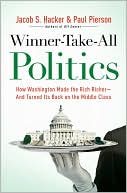The Anti-Intellectual Presidency: The Decline of Presidential Rhetoric from George Washington to George W. Bush
Why has it been so long since an American president has effectively and consistently presented well-crafted, intellectually substantive arguments to the American public? Why have presidential utterances fallen from the rousing speeches of Lincoln, Teddy Roosevelt, Wilson, and FDR to a series of robotic repetitions of talking points and sixty-second soundbites, largely designed to obfuscate rather than illuminate?\ In The Anti-Intellectual Presidency, Elvin Lim draws on interviews with more...
Search in google:
Why has it been so long since an American president has effectively and consistently presented well-crafted, intellectually substantive arguments to the American public? Why have presidential utterances fallen from the rousing speeches of Lincoln, Teddy Roosevelt, Wilson, and FDR to a series of robotic repetitions of talking points and sixty-second soundbites, largely designed to obfuscate rather than illuminate?In The Anti-Intellectual Presidency, Elvin Lim draws on interviews with more than 40 presidential speechwriters to investigate this relentless qualitative decline, over the course of 200 years, in our presidents' ability to communicate with the public. Lim argues that the ever-increasing pressure for presidents to manage public opinion and perception has created a "pathology of vacuous rhetoric and imagery" where gesture and appearance matter more than accomplishment and fact. Lim tracks the campaign to simplify presidential discourse through presidential and speechwriting decisions made from the Truman to the present administration, explaining how and why presidents have embraced anti-intellectualism and vague platitudes as a public relations strategy. Lim sees this anti-intellectual stance as a deliberate choice rather than a reflection of presidents' intellectual limitations. Only the smart, he suggests, know how to dumb down. The result, he shows, is a dangerous debasement of our political discourse and a quality of rhetoric which has been described, charitably, as "a linguistic struggle" and, perhaps more accurately, as "dogs barking idiotically through endless nights." Sharply written and incisively argued, The Anti-Intellectual Presidency sheds new light on the murky depths of presidential oratory, illuminating both the causes and consequences of this substantive impoverishment. Publishers Weekly This slim, scathing book does not mince words about the current state of presidential rhetoric, frankly deploring its "nosedive from our founding era." Drawing upon interviews with 42 presidential speech writers, Lim investigates what he sees as a particularly American phenomenon whereby "most presidents have preferred to appear less, not more intellectually inclined than they actually were." He reveals the long "institutional pedigree" of anti-intellectualism in presidential addresses, from Harding to Eisenhower, Clinton ("an intelligent but anti-intellectual president") to Bush, as presidents have positioned intellectuals as the "piñatas of American politics." Lim builds his case systematically, introducing fascinating indices to measure oratorical sophistication or simplicity. A massive campaign of "linguistic simplification" is afoot, he argues, and he dissects inaugural addresses and presidential public papers, charting average sentence length, Flesch Readability and the preponderance of platitudes to evince a growing "reification of style over substance." While his methodology is occasionally esoteric, Lim's presentation of the consequences of the manipulation of language in the political arena is clear and compelling, and will delight grammarians and political aficionados alike. (June)Copyright © Reed Business Information, a division of Reed Elsevier Inc. All rights reserved.
The Problem of Presidential Rhetoric 3The Linguistic Simplification of Presidential Rhetoric 19The Anti-Intellectual Speechwriters 40The Substantive Impoverishment of Presidential Rhetoric 54Institutionalizing the Anti-Intellectual Presidency 77Indicting the Anti-Intellectual Presidency 100Reforming the Anti-Intellectual Presidency 115The General Inquirer (GI) 123Definitions of General Inquirer Categories Used 127Annual Messages, 1790-2006 129Inaugural Addresses, 1789-2005 135Presidential Speechwriters Interviewed 137The Flesch Readability Score 141Notes 143Index 175
\ Publishers WeeklyThis slim, scathing book does not mince words about the current state of presidential rhetoric, frankly deploring its "nosedive from our founding era." Drawing upon interviews with 42 presidential speech writers, Lim investigates what he sees as a particularly American phenomenon whereby "most presidents have preferred to appear less, not more intellectually inclined than they actually were." He reveals the long "institutional pedigree" of anti-intellectualism in presidential addresses, from Harding to Eisenhower, Clinton ("an intelligent but anti-intellectual president") to Bush, as presidents have positioned intellectuals as the "piñatas of American politics." Lim builds his case systematically, introducing fascinating indices to measure oratorical sophistication or simplicity. A massive campaign of "linguistic simplification" is afoot, he argues, and he dissects inaugural addresses and presidential public papers, charting average sentence length, Flesch Readability and the preponderance of platitudes to evince a growing "reification of style over substance." While his methodology is occasionally esoteric, Lim's presentation of the consequences of the manipulation of language in the political arena is clear and compelling, and will delight grammarians and political aficionados alike. (June)\ Copyright © Reed Business Information, a division of Reed Elsevier Inc. All rights reserved.\ \








